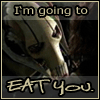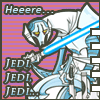
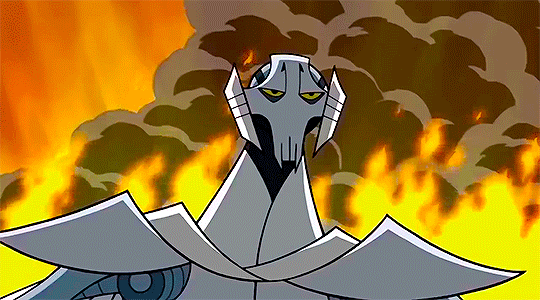
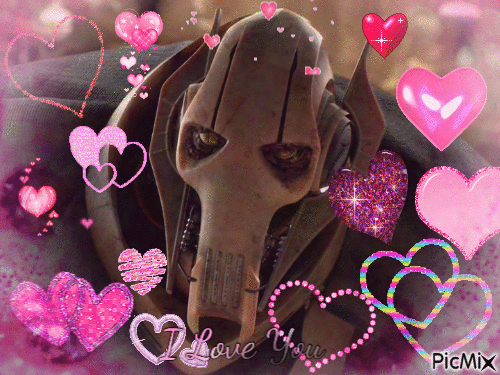
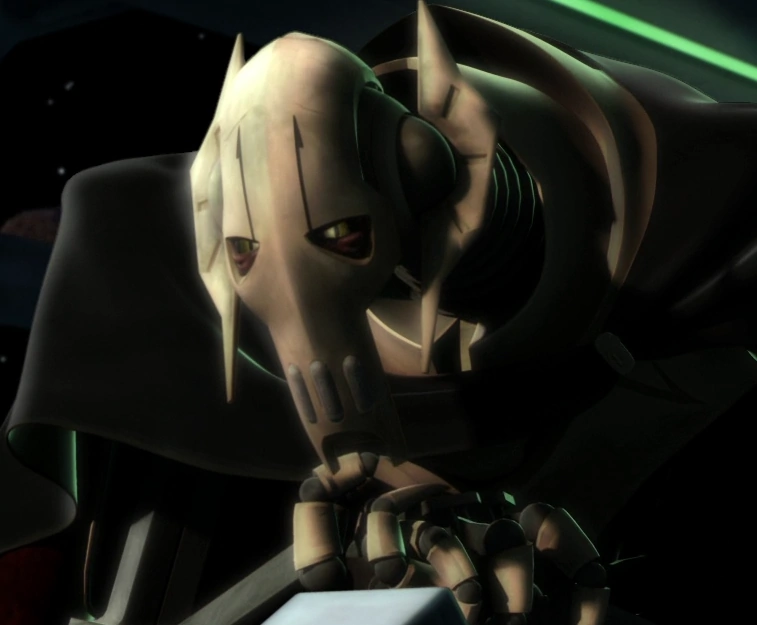
WHAT GRIEVOUS MEANS 2 ME
I first got interested in Grievous as a character sometime in July 2020. Prior to that, I was never really a Star Wars fan, and I still don't really consider myself a Star Wars fan, I am quite literally only here for this one guy. I really liked his character design, and that motivated me to look more into media that he had been in and what had been written about his backstory/who he was as a person. I think he is absolutely criminally underutilized by Lucasfilm, and personally I think there's potential for a really powerful story with him at the center of it. Throughout this page I'll go more in depth into my issues with how he was handled, how I think he deserves better, and why I love him so much.
BACKGROUND
Lucasfilm's Writing Problems
Grievous is possibly the most egregious instance of the recurring problem that Star Wars has with using visible assistive devices or prosthetics to visually indicate that a character is villainous or morally compromised in some way. The fact that he is a cyborg and "more machine than man" is frequently cited as a significant part of his villainy and a point of revulsion. You're supposed to hate him because he is inhuman in this way. His cultural identity as a Kaleesh man is completely ignored in favor of referring to him as a "droid general" or otherwise trying to downplay the fact that he's a person. I don't think I can think of one single instance of a character actually referring to him as a Kaleesh cyborg within actual official media. He is frequently used as a convenient excuse for the writers to go off on a rant about how someone who is more machine than flesh is somehow lacking in humanity and to theorize about how this somehow affects his morals. This is obviously a massive problem. Additionally, I feel like the retcon of his original more sympathetic backstory (which is too long to fully explain here, but the Legends version of his Wookieepedia page has a good summary, I think) was a big mistake, and it would have been a great opportunity to explore the fact that the Republic also has problems with corruption and has wartime sins it needs to answer to.
Place in the Narrative
Before getting into a narrative centered around him as a person, I'd like to talk about the narrative purpose Grievous serves in a story still centered around the protagonists and the Republic. Grievous is, essentially, the Republic's actions coming back to bite them in the ass. When the Republic and by extension the Jedi Order got involved in the Huk War, they made the choice to side with slavers and colonizers and punished the Kaleesh for rebelling against their oppressors, causing untold suffering on Kalee and millions of lives lost. By forcing Kalee into famine and subjugation, the Republic directly set into motion the sequence of events that would lead Grievous down the path to becoming the ruthless cybernetic Jedi-killer he became. Every Jedi and clone death at the hands of Grievous is directly because the Republic chose to side with violent oppression. They are forced to reckon with the grief-and-rage-fueled destructive power of the monster they created.
Regarding the narrative centered on him personally, I will just say up front: it is not a satisfying narrative to have a former freedom fighter disabled veteran become only another character's political pawn and die without a resolution to his storyline. Furthermore, any telling of Grievous's personal story must include a focus on his need for bodily autonomy in order to be told correctly. It is not adequately addressed within the source media that Grievous's bodily autonomy being forcibly taken away from him when a shuttle accident was purposefully orchestrated in order to destroy his body and give him cybernetics without consent was a deeply wrong thing for his superiors in the CIS to do. Regardless of his actions, he has the right to feel like his body is his own and to feel at home in his body.
However, regardless of how I feel he was mishandled, there are a few specific parts of his story that stick out to me and draw me to him as a character. First, it's been firmly established in canon that from the very beginning all the way to the end of his life and after, his people on Kalee always loved him and were incredibly proud of him. He was the one powerful person out in the galaxy who had always fought for them and always had their best interest in mind. Even after his death, they never forgot him; there's an interaction written down that someone had with a spacefaring Kaleesh decades after the Clone Wars who proudly told stories of a legendary warrior who was augmented with cybernetics to become even stronger. This specifically also seems to indicate that his people never saw him as any less of a full person because of his cybernetics/his disabled body. Even later, it's stated that he was added to the Kaleesh religious pantheon as a demigod. His people never abandoned him and they never forgot him, and as the timeline of Star Wars stretches on they probably never will. The idea that, despite everything, Grievous was always unconditionally beloved, has really stuck with me.
Second, it is canon that at no point during the Clone Wars was Grievous ever aware of the fact that the war was simply a cover for a Sith plot to take over the galaxy or that Sidious was actually Palpatine. He was never informed of any of that. He was solely in the war for Kalee and to get revenge on those who had hurt him so badly. Grievous has no secret plans for galactic domination or desire to manipulate or lie to the people following his command. What you see is what you get. For some reason this is refreshing to me. I can't really put my finger on why, but it's something to do with the fact that everything he does is motivated purely by raw messy rage and grief, nothing else, no conniving calculatedness, just raw hurt.
MY THOUGHTS
Note: there's some headcanon in this, specifically regarding his early life
He was born out of nothing. In the age of the New Republic, scholars looking to understand how this all started will take interest in his origins, and will find no records. The names of his parents were never written down and the village where he was born no longer exists, burned to the ground by the Huk when he was scarcely a teen.
He sees the Jedi snivelling about how violence is never the answer, and he thinks back to being eight years old and wiping off hemolymph sprayed across his face after picking up his father's gun he had dropped on the ground being grabbed by the throat by the Huk scout who had caught him off guard. He scoffs.
Grievous is the rage of generations suffering and oppressed focused all together into one sharp point. Nobody came to help him or his people, nobody at all. He did it all himself and he dragged himself up out of absolutely nothing to lead them all to victory.
He is a whirling maelstrom of pain and grief and righteous fury that burns so white hot to look at him is to burn your eyes, tears streaming down your cheeks as you struggle to behold him. He is the unbreakable spirit and unflappable belief that despite everything he's gone through there's still a future worth fighting for so close he can almost reach out and grab it. He is the brightest star in the sky over Kalee, somewhere out there in the cosmos, a trail of glowing sparks snaking out behind him as he flies, burning through it all and not saving an ounce of fuel for the way back. He will rest when he's dead and he will never die because he's come so far and burnt so bright that when his body tethering him to the world of the living expires his memory will never be forgotten until the Kaleesh people simply cease to exist.
In the end, Grievous wins. Kalee is free. He wants no empire, no galactic influence, just for him and his people to be left alone. And that's what he gets, in the end.
 IMAGE COLLECTION
IMAGE COLLECTION





 IMAGE COLLECTION
IMAGE COLLECTION

















